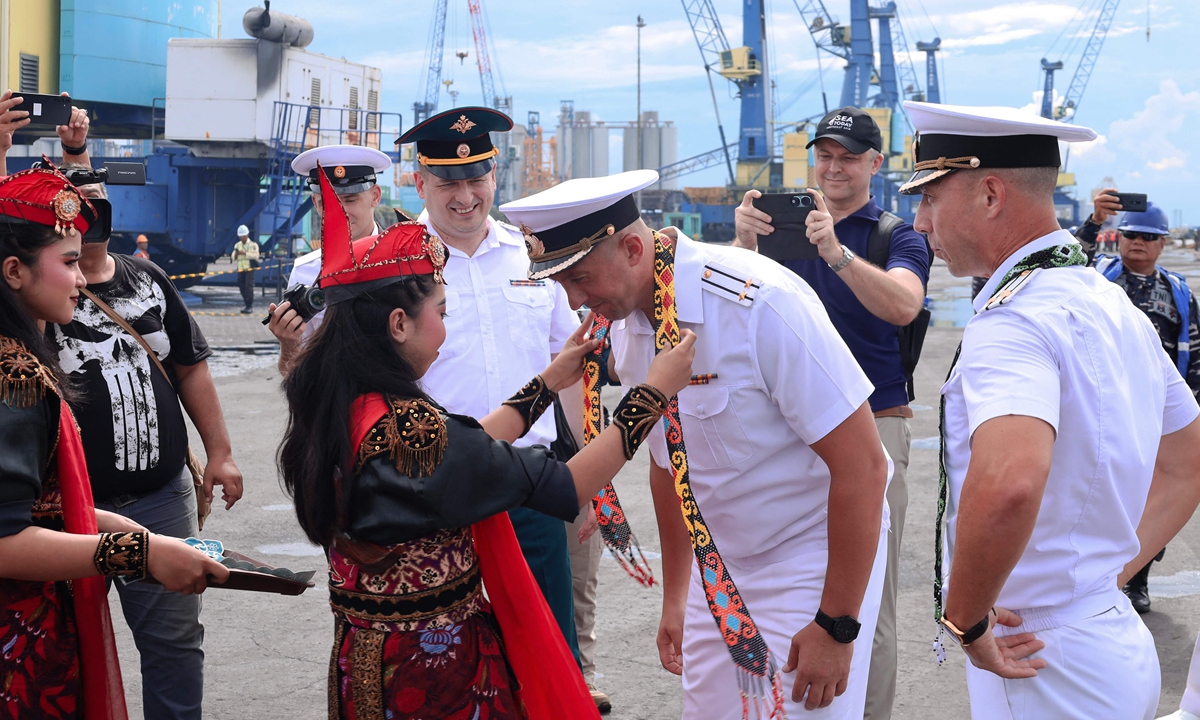
Local dancers welcome Rear Admiral Alexei Sysuev (right), Commander of the Primorsky Flotilla of the Pacific Fleet, and Andrei Kazazev (center), Commander of the Russian corvette Gromkiy, upon their arrival at Tanjung Perak port on November 3, 2024, for a five-day joint military exercise between Indonesia and Russia, in Surabaya. Photo: VCG
Naval forces of Indonesia and Russia began their first joint military training drills in the Java Sea on Monday, Reuters reported, citing analysts as saying that this "shows the Southeast Asian country's willingness to befriend any country."
Chinese experts said on Monday that Indonesia's independent foreign policy, which seeks to foster positive relations with nations including China, the US, and Russia without aligning with any specific side, benefits Indonesia's national autonomy by prioritizing and safeguarding its own interests.
The five-day drills will take place in two phases at a naval base in Surabaya and in the Java Sea. Russia has sent three corvette class warships, a medium tanker ship, a military helicopter, and a tug boat, the Indonesian Navy said in a statement, AFP reported.
ASEAN, which Indonesia is a member of, held joint exercises with Russia in 2021, but Jakarta had never held drills alone with Moscow before this week, according to AFP.
The joint exercise comes as Indonesia's newly-inaugurated President Prabowo Subianto has pledged closer ties with Russia on defense, in his bid to forge ties with any country as part of his country's long-held non-alignment foreign policy, read the Reuter's report.
AFP quoted analysts as saying that the "joint exercises signal Prabowo is beginning a significant foreign policy shift, pledging to boost Jakarta's alliances with major powers."
"Indonesia is committed to an independent foreign policy, rather than dependent diplomatic strategies. As the global landscape continues to evolve, Indonesia is increasingly recognizing the importance of emerging countries like itself taking on a more prominent role within the international system, and this means they should not be subject to the US' pressure to take sides," Song Zhongping, a Chinese military expert, told the Global Times on Monday.
Indonesia's foreign policy is characterized by diversification, seeking to maintain positive relations with countries including China, the US, and Russia, while avoiding alignment with any particular side, Song said, noting that this strategy is advantageous for Indonesia's national autonomy and the development of its foreign policy, as taking sides would likely result in the loss of more valuable opportunities.
"This is also beneficial for maintaining peace and stability in the region," Song said.
In addition to Indonesia, many ASEAN countries have adopted an independent and autonomous foreign policy, particularly a diplomatic approach that emphasizes balancing relations with major powers, Gu Xiaosong, dean of the ASEAN Research Institute of Hainan Tropical Ocean University, told the Global Times on Monday.
According to Free Malaysia Today on November 1, Malaysian Prime Minister Anwar Ibrahim, who is on a working visit to China from Monday to Thursday, has revealed that he recently rejected a call by the top US diplomat to stop being friendly with Russia by saying "We are an independent, sovereign country; we make decisions for our people and our nation."
Many ASEAN countries do not take sides; instead, they pursue foreign policies that prioritize the protection of their own national interests, Gu said.




